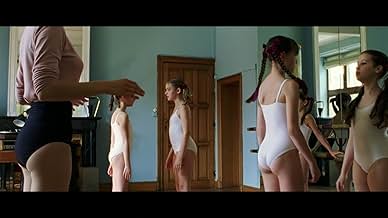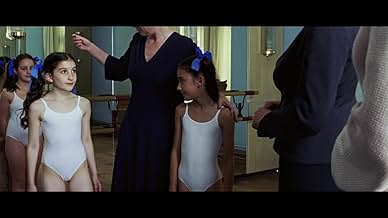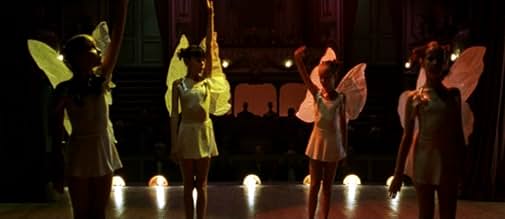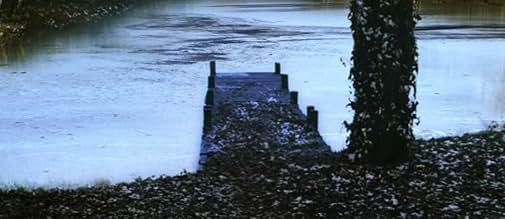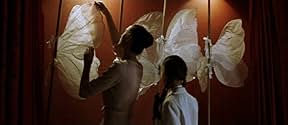IMDb-BEWERTUNG
6,8/10
6789
IHRE BEWERTUNG
Ein Blick in ein abgelegenes Internat für junge Mädchen.Ein Blick in ein abgelegenes Internat für junge Mädchen.Ein Blick in ein abgelegenes Internat für junge Mädchen.
- Regie
- Drehbuch
- Hauptbesetzung
- Auszeichnungen
- 8 Gewinne & 2 Nominierungen insgesamt
Empfohlene Bewertungen
Innocence is a unique film that defies typical description and ignores filmmaking conventions. If you like films that confuse and surprise, you just might love this. If you need something loud, viscerally exhilarating or explicit, look elsewhere. Innocence is a film that plays with our preconceived notions about underage female sexuality. If you enjoy Suspiria of (the real) Alice in Wonderland this little-seen French gem comes highly recommended. However, this film does not glorify in cute girls dancing or wandering through fantastical dreamworlds. Yes, it is dreamlike and mystifying, but this is not Dario Argento.
Innocence approaches Picnic at Hanging Rock's dreamlike quality. What it manages to achieve is presenting what is both natural but unfamiliar through the eyes the young girls experiencing it. Innocence film is very dreamlike and doesn't rest on one main character's perspective.
Innocence is both haunting and sweet. This is a film about the loss of innocence in young girls, but it toys with our notions of innocence, sexuality and objectification. In short, what does being a woman today mean? You won't be satisfied though one viewing of this film. If watching something once only makes you want to see it again, it must be worth it.
Seek this out. Pass over the latest trending rental and add this to your Netflix queue.
Innocence approaches Picnic at Hanging Rock's dreamlike quality. What it manages to achieve is presenting what is both natural but unfamiliar through the eyes the young girls experiencing it. Innocence film is very dreamlike and doesn't rest on one main character's perspective.
Innocence is both haunting and sweet. This is a film about the loss of innocence in young girls, but it toys with our notions of innocence, sexuality and objectification. In short, what does being a woman today mean? You won't be satisfied though one viewing of this film. If watching something once only makes you want to see it again, it must be worth it.
Seek this out. Pass over the latest trending rental and add this to your Netflix queue.
The final title, "for Gaspar" (Noe, director of IRREVERSIBLE), hints at the pedigree of the makers of this quite fascinating study of young girls on the cusp of adolescence.
Benoit Debie, the cinematographer of IRREVERSIBLE, shot the film.
Six year old Iris (Zoe Auclair) arrives at her new country school in a coffin. She becomes infatuated with twelve-year-old Bianca (Berangare Haubruge) who disappears each evening and returns in the morning. The girls spend most of their days studying ballet and preparing for an important exam.
The school is like a keep. The girls are encouraged to find happiness in obedience. Parents never visit. The world beyond its tall hedges exists like something within a dream.
Director Lucile Hadzihalilovic imbues every aspect of the film with a dreamy, meditative veneer. Shots of the pre-teen nymphs dancing, cartwheeling and splashing about in shallow water recall the grainy erotic imagery of David Hamilton's early feature films -- in particular, LAURA and BILITIS. The ballet sequences and striking compositions of solitary female figures in towering external landscapes owe a small debt to Dario Argento's SUSPIRIA and, to a lesser extent, his PHENOMENA. But this is not a deliberate softcore meditation on childhood sexuality. It is a metaphorical examination of how innocence is ruptured by its own curiosity.
The camera angles stress the importance and prominence of legs to a fetishistic degree. This focus is an organic extension of the girls' ballet training; a darker purpose for legs is indicated later in a chilling line of dialogue. Debie's cinematography emphasizes light and shade and is never pretty for its own sake.
The forest filled with lamps has a deliciously surreal, fairytale quality. The sequences where the girls dance for a faceless audience reminded me of one of MULHOLLAND DRIVE's most haunting sequences. The film's sound design also echoes the internal voids of the Lynchian world.
The film is not big on explanations and is a touch too slow at times, but it presents a thoroughly realized universe that is a stark metaphor for life's discoveries and disappointments. The performances possess perfect pitch and the tone remains both haunting and consistent.
What exactly is the film about? The girls may be in a purgatory of sorts, a resting place between life and death. Perhaps not. Perhaps they are in a holding pattern between childhood (innocence) and adulthood (a state requiring some loss of innocence), and when they manage to escape (succumbing to their pre-adolescent curiosity), they have forfeited their place in childhood forever. But only perhaps.
Benoit Debie, the cinematographer of IRREVERSIBLE, shot the film.
Six year old Iris (Zoe Auclair) arrives at her new country school in a coffin. She becomes infatuated with twelve-year-old Bianca (Berangare Haubruge) who disappears each evening and returns in the morning. The girls spend most of their days studying ballet and preparing for an important exam.
The school is like a keep. The girls are encouraged to find happiness in obedience. Parents never visit. The world beyond its tall hedges exists like something within a dream.
Director Lucile Hadzihalilovic imbues every aspect of the film with a dreamy, meditative veneer. Shots of the pre-teen nymphs dancing, cartwheeling and splashing about in shallow water recall the grainy erotic imagery of David Hamilton's early feature films -- in particular, LAURA and BILITIS. The ballet sequences and striking compositions of solitary female figures in towering external landscapes owe a small debt to Dario Argento's SUSPIRIA and, to a lesser extent, his PHENOMENA. But this is not a deliberate softcore meditation on childhood sexuality. It is a metaphorical examination of how innocence is ruptured by its own curiosity.
The camera angles stress the importance and prominence of legs to a fetishistic degree. This focus is an organic extension of the girls' ballet training; a darker purpose for legs is indicated later in a chilling line of dialogue. Debie's cinematography emphasizes light and shade and is never pretty for its own sake.
The forest filled with lamps has a deliciously surreal, fairytale quality. The sequences where the girls dance for a faceless audience reminded me of one of MULHOLLAND DRIVE's most haunting sequences. The film's sound design also echoes the internal voids of the Lynchian world.
The film is not big on explanations and is a touch too slow at times, but it presents a thoroughly realized universe that is a stark metaphor for life's discoveries and disappointments. The performances possess perfect pitch and the tone remains both haunting and consistent.
What exactly is the film about? The girls may be in a purgatory of sorts, a resting place between life and death. Perhaps not. Perhaps they are in a holding pattern between childhood (innocence) and adulthood (a state requiring some loss of innocence), and when they manage to escape (succumbing to their pre-adolescent curiosity), they have forfeited their place in childhood forever. But only perhaps.
Amazing. Not for all tastes, to be sure, but infinitely intriguing and accomplished. Great movie. After all the previous not totally successful, or barely watchable or downright awful fantasy movies that have come out of France in the last five years or so, French cinema turns out to be capable of producing an intelligent, beautiful, original work of art with its roots in the fantasy field which is both a treat to the eye and intelligence, and a graphically arresting piece of movie making. The film, dealing with strange ongoings at a remote boarding school for young girls in a mystery-ridden forest somewhere, is incredibly catching, full of hypnotic images. It is indeed closer to the spirit of silent movies, in particular the German school of Fritz Lang, Murnau, Pabst, etc, than to most modern movies. But so brilliant and respectful in its approach that it soon makes you forget its origins. The are dreamlike visions by the dozen in Innocence, superior or equal to Lynch's best films, to Jackson's Heavenly Creatures, or to Jane Campion's cinema in its finer moments, for instance. A painter in terms of framing and composition, the director is always lifting the material up into poetry country. See it and you will not be left untouched. Few films ever reach that kind of weirdness and movie magic. It has no comparison. Really.
10o_cubitt
Innocence is an extraordinary film that explores its theme with such determined rigor one cannot help but be compelled and shocked by every moment. Innocence explores the period in girls' lives before they lose their Innocence and start adulthood. The mysterious school to which we are introduced through Tarkovskyesque images of flowing water becomes a dark and at times haunting manifestation of both the young girls' enforced Innocence as well as the setting for the film's mystery narrative in which we find ourselves desperate to see through the schools wooded grounds to some kind of epiphany.
Part of the success of Innocence is that it is able to confuse the viewer and forces the audience to confront their own ideas of Innocence and how we as adults should view images of Innocence. Images of the young girls at play should be easier to watch but this is an adult film with a predominately adult audience and the darkness of the films own geography plays with ones ideas of Innocence and the loss of it.
Extraordinary images, extraordinary performances, a great film.
Part of the success of Innocence is that it is able to confuse the viewer and forces the audience to confront their own ideas of Innocence and how we as adults should view images of Innocence. Images of the young girls at play should be easier to watch but this is an adult film with a predominately adult audience and the darkness of the films own geography plays with ones ideas of Innocence and the loss of it.
Extraordinary images, extraordinary performances, a great film.
Reading a lot of the interesting comments people have made about this film, it's obvious most didn't understand it.I admit this includes me. I enjoy an original idea for a movie, one that makes you think, but if it is too obscure surely that defeats the object? A lot of the comments mention paedophiles, an overused word that's fashionable at the moment.I'm a bloke but ye Gods, these were tiny little girls and not sexual. Someone mentioned the bathing and said they were uncomfortable with it. Nobody was nude! If a scene such as this makes a person less than happy, I suggest it says a lot about that person's mind. David Hamilton's 'Bilitis' has a scene where a group of schoolgirls strip off and go gamboling in the sea, that is certainly done, (in my view) to titillate. Innocence isn't at all like that. Europeans such as the French and Germans have, it seems to me, a lot healthier attitude to sex than either the Brits' or the US who tend to look for an ulterior motive in anything. Having said that- There is an interview with director Lucile Hadzihalilovic on the DVD, in it she mentions words to describe the movie, such as paradise, prison, nature, appealing and interesting.She says the film is essentially sensual and a claustrophobic universe. Also says that there is no violence and nothing offensive in it. It interested me to hear her say that women would identify with it easier than men, as their own view of young girls will be evoked. For some that may be problematic, for others, not at all. Read in that what you will chaps. There are few sights more pleasurable than a happy female, (of any age.) I remember an old saying, - 'Little girls, like butterflies, need no excuse.'
Wusstest du schon
- WissenswertesIn the 'extras' on the DVD release, the director relates that children playing unsupervised in nature (the forest, the pond) is a 'freeing' setting for them, an 'uncontrolled' environment to explore. Water is very important, as it is a highly visible medium in its many forms (including within or from underneath a surface), and it is necessary, sensual, and enjoyable, but also dangerous (the drowning), and evokes many emotions. Flowing water can also symbolize the passage of time. The dynamic of children relating to adults, not understating them or their actions, while seeing them as role models, is another dichotomy the director wanted to emphasize. Ambiguity and a 'dream-like' quality are also important elements of the film. She states they digitally enhanced or 'tweaked' colors in the film to 'non-realistic' tones, to achieve mood and lighting effect, particularly day for night shots. The director says she is not interested in explaining meaning: "... what I like in cinema is being lost. I like films I don't completely understand, so they stay with me longer after they're over," and, "I believe everyone can find their own stories within the film."
- PatzerWhen Bianca says goodbye to all the girls there is snow in the alley and they are all outside dressed with bare arms and bare legs. Then Bianca runs away in pouring rain. No more snow on the ground.
- Crazy CreditsThe entire set of credits is shown at the opening of the movie.
- VerbindungenFeatured in Women Make Film: A New Road Movie Through Cinema (2018)
- SoundtracksOrchestral Suite from La Petite Renard Rusée
Composed by Leos Janácek
Libretto by Rudolf Tesnohlídek
Performed by Czech Philharmonic (as The Czech Philharmonic)
Conducted by Vaclav Talich
Top-Auswahl
Melde dich zum Bewerten an und greife auf die Watchlist für personalisierte Empfehlungen zu.
- How long is Innocence?Powered by Alexa
Details
- Erscheinungsdatum
- Herkunftsländer
- Sprache
- Auch bekannt als
- Невинність
- Drehorte
- Parc du Cinquantenaire, Brüssel, Belgien(walking to new school)
- Produktionsfirmen
- Weitere beteiligte Unternehmen bei IMDbPro anzeigen
- Laufzeit
- 2 Std. 2 Min.(122 min)
- Farbe
- Sound-Mix
- Seitenverhältnis
- 2.35 : 1
Zu dieser Seite beitragen
Bearbeitung vorschlagen oder fehlenden Inhalt hinzufügen


